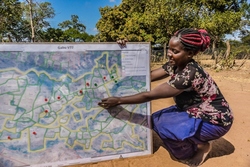Podcast: Indigenous land rights and the global push for land privatization
by Mike Gaworecki
- We discuss the importance of securing Indigenous land rights within the context of a global push for land privatization on today’s episode of the Mongabay Newscast
- Cultural Survival’s Daisee Francour joins us to discuss why land rights are so vital to the wellbeing of Indigenous communities and the cause of conservation.
- The Oakland Institute’s Anuradha Mittal discusses the think tank’s new report on the global push by governments and corporations to privatize land in the name of economic development and how that can dispossess Indigenous and local communities of their land.
- “In the midst of a pandemic and a growing climate crisis, we are seeing that governments, corporations, and international finance institutions–instead of addressing the crises–are wanting to exploit even more natural resources, like land,” Mittal says.
Today we’re taking a look at the importance of securing Indigenous communities’ land rights and the global push for privatization that can deprive those communities of access to their land.
Listen here:
A study published in Nature Sustainability in 2018 found that Indigenous Peoples manage or have tenure rights over about 38 million square kilometers of land in 87 countries, more than a quarter of the world’s land surface, and that those lands intersect about 40% of all terrestrial protected areas and ecologically intact landscapes. Another study published earlier this year in Frontiers in Ecology and the Environment found that Indigenous lands hold 36% or more of remaining intact forest landscapes. Both these studies are just part of the growing body of evidence showing that recognition of Indigenous Peoples’ rights to their land is crucial to conservation.
To discuss Indigenous land rights and why they’re vital to meeting conservation goals around the world, we welcome to the podcast Daisee Francour, a member of the Oneida nation of Wisconsin in the United States and the director of strategic partnerships and communications for the NGO Cultural Survival.
We also welcome onto the podcast Anuradha Mittal, the executive director of the Oakland Institute, a think tank based in California that recently released a report titled Driving Dispossession: The Global Push To Unlock The Economic Potential Of Land. Mittal explains how governments and corporations the world over are pushing for land to be put into “productive use” as a means of economic development, and how that can dispossess Indigenous and local communities of their land without regard for the myriad benefits their land has for Indigenous cultures and livelihoods.














